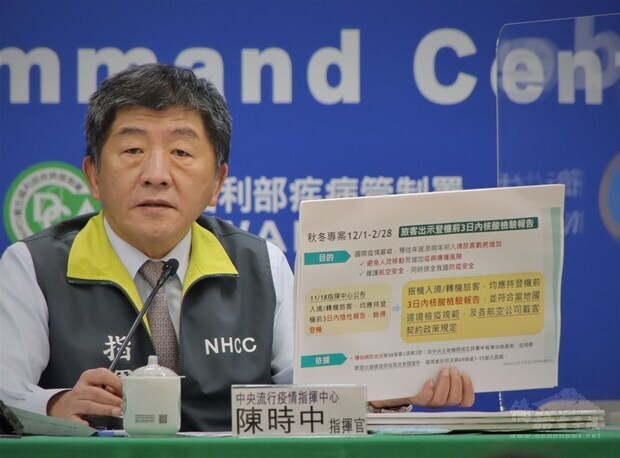
Taipei, Nov. 25 (CNA) All arrivals to Taiwan must present a negative COVID-19 test, starting Dec. 1, with exemptions for individuals coming from countries where self-paid tests are unavailable, urgent situations and where prior approval has been given, the Central Epidemic Command Center (CECC) announced Wednesday.
The CECC announcement came as a follow-up after it announced last week that starting next month all inbound and transit passengers must present a negative COVID-19 RT-PCR test taken within three days of boarding when checking in.
However, the new policy raised concerns among overseas Taiwanese business people who might not be able to return to the country because they operate in nations that do not have facilities or trained health workers to carry out such tests.
At present, only foreign nationals are required to have proof of a negative COVID-19 test when visiting Taiwan, while Taiwanese citizens, Alien Resident Certificate (ARC) holders and Alien Permanent Resident Certificate (APRC) holders are exempt.
The CECC listed exemptions on Wednesday amid concerns over the new policy, which is part of expanded measures to prevent the spread of the pandemic in anticipation of a new wave of infections during the autumn and winter period.
According to the CECC, those who need to visit Taiwan for emergency medical treatment; to visit close relatives within a second degree of kinship currently in critical condition; or attend the funeral of close relatives within a second degree of kinship, will be able to board a plane to Taiwan without a COVID-19 negative test result if they show documents such as a death certificate, critical illness certificate or diagnosis certificate.
The CECC will ask airlines to keep such individuals separate from other passengers and provide a self-paid test once they arrive in Taiwan, it noted.
If people depart from countries where no self-paid COVID-19 testing is available, they will be asked to sign a written statement to that effect so airlines can seat them accordingly. They will also need to take self-paid test upon arrival, it said.
In addition, those who need to visit Taiwan for official business and have made a prior application via local government authorities and received approval from the CECC will also be able to visit the country without showing negative test results, it added.
These exemptions do not apply to those who transit through the country, it added.
Meanwhile, Taiwan nationals who contract the virus abroad but are in critical condition and undergoing treatment in areas where the standard of medical and healthcare are poor can also apply to return to Taiwan for further treatment, according to the CECC.
According to current regulations, it is mandatory for citizens who contract the virus abroad to meet certain health criteria before being allowed into the country.
They need to have two consecutive negative tests or have no symptoms of the disease for two months since contracting it. They must report to the Taiwan health authorities in advance and failure to do so may result in a fine of up to NT$2 million (US$70,130) or a maximum two-year prison sentence.
The CECC recently allowed a Taiwanese businessman in Ghana who was in critical condition and being treated for COVID-19 to return to the country last week even though he did not meet the required health criteria.
Other than the listed exemptions, all inbound and transit passengers who fail to present COVID-19 negative results are required to take a test upon arrival and face a fine of NT$10,000 to NT$150,000, as well as possible criminal charges if they are determined to have infected others.
Such individuals will also not be able to file for quarantine compensation, the CECC said.
Currently, individuals subject to home isolation or home quarantine for 14 days to prevent the spread of the COVID-19 coronavirus are entitled to NT$1,000 per day in compensation.